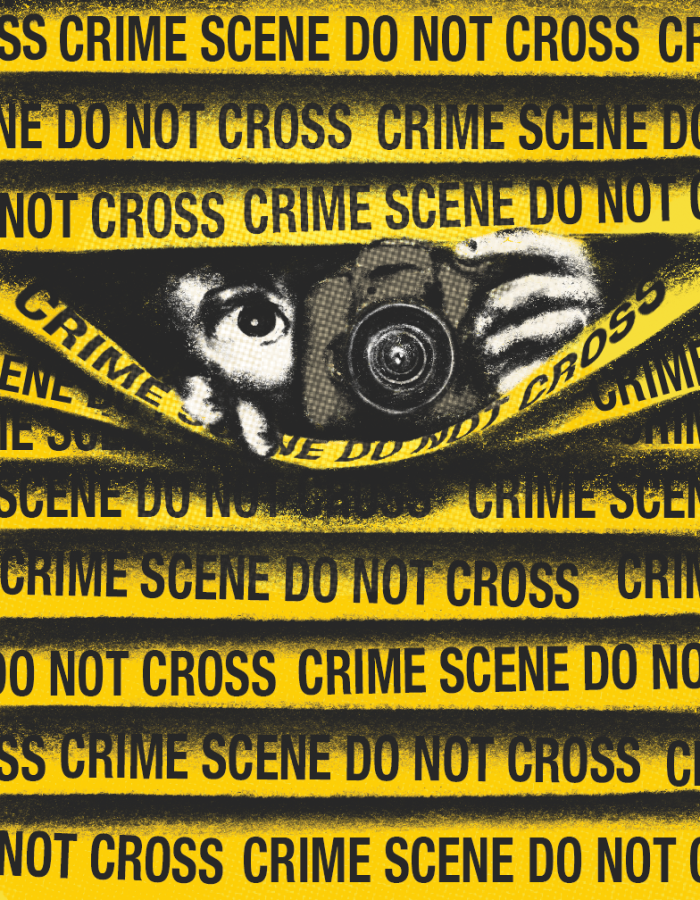Opinion: Tragedies for profit: Issues with “new age” true crime videos
Art: Palina Kuzmina
“He killed his girlfriend for saying her ex’s name (hot cheeto hot pocket mukbang).”. This is the title of one of many true crime videos recommended to me on YouTube. The thumbnail showcases a giant platter of the bright red, cheesy meal front and foremost, the murderer’s face only faintly lingering in the background.
Videos like these have blown up online; it’s a disturbing trend where creators combine true crime with different content genres like makeup or mukbangs (a genre which includes a creator eating on camera), adopting a conversational tone to “spill the juiciest details” of the case whilst doing a mundane task.
While true crime as a concept has been around for decades, the evolution of video sharing platforms means anyone can upload their own true crime content. The largest pitfalls of this new age true crime is misinformation, the presentation of the video and the harm unwanted awareness brings to the families of the victim. I witnessed these issues firsthand in the comment section of a popular creator Eleanor Neale’s video on the 2018 murder of Joy Morgan.
Misinformation
The hour-long video delved deep into the victim’s personal life and the events that led up to her death. Following its publishing, the alleged sister of Morgan left a long comment detailing the numerous inaccuracies in the video. Other viewers flooded the responses, many speculating on the murder and defending Neale.
A specific fact which the alleged sister denied was Morgan saying racist remarks toward her mother. This detail would undoubtedly paint Morgan in a bad light, and this is reflected in the comments as one viewer said, “Maybe you should make your own video on the ‘truth.’ If your sister joined a cult that discriminates, it’s not important now is it.”
The most common defense of Neale I saw was that she is just one person compiling information off the Internet. However, this is not an excuse. Sensitive topics should be covered with the utmost accuracy regardless of how many people are reporting on them. If a single person or small team is unable to conduct the research necessary, they should not report on them at all.
Presentation
The second major issue with these true crime videos is that regardless of accuracy, the presentation of the information is questionable at best and problematic and damaging at worst. True crime television typically adopts the style of “soft news,” akin to history documentaries. In contrast, YouTube true crime replicates the style of gossip channels.
I find this way of storytelling to be generally distasteful. It seems that some of the most popular niches of true crime are makeup videos and mukbang. It’s likely that they are combining a popular video format with true crime because it’s guaranteed internet traction. However, intention doesn’t matter to me in this case. These are real traumatizing events for some people, and presenting them as if it were high school gossip desensitizes the audience to this fact.
By turning true crime into something so lighthearted, we take away the gravity of the situation. Playing armchair detective in the comment section is both normalized and encouraged by many creators. This baffles me. Under Neale’s video alone, I saw people speculating on Morgan’s murder openly for her alleged sister to see, and I can’t imagine how she would feel seeing those comments. If these true crime YouTubers were truly as morally sound as they claim, they would disable the comment section altogether. However, just like with their presentation, comments create traction, and the ultimate incentive to keep creating these videos is profit.
Harm to the victim
A common counter argument I’ve seen online was that these videos “bring awareness to the victim’s story.” But something that seems to often be left out is whether the family and friends of the victim even want such traumatic and painful events publicized. It’s typically expected of professional true crime productions to collaborate, or at the least communicate, with the victim’s family. However I seriously struggle to believe the average YouTuber does the same. As many of them state themselves, the information they present was simply found on the internet.
Without proper consent from the family of the victims, these true crime videos can retraumatize. In her comment under Neale’s video, Morgan’s alleged sister asked for it to be taken down due to inaccurate information, however the video remained up for another three weeks before finally being removed. For three weeks her sister was bombarded with comments regarding Morgan’s death, all while the channel collected revenue from the video.
It would be dichotomous to say that tragedies can never be profited off, but I believe that these videos are doing more harm than good. Not much can be done about the YouTube algorithm and what videos it will promote, but it is up to the viewer to ultimately decide what they watch — so, the next time you see a true crime video title followed by something like “(hot cheeto hot pocket mukbang),” think twice about clicking.



